The federal government in Australia is seeking bipartisan support to address the socio-economic disparities faced by Aboriginal and Torres Strait Islander people. A new report by the Productivity Commission revealed that only five out of 19 targets in the Closing the Gap strategy are on track to be met. Minister for Indigenous Australians Malarndirri McCarthy expressed concern over the lack of progress and vowed to work with various stakeholders to bring about positive change.
According to the report, targets related to healthy birth weight, preschool enrollment, and Indigenous employment are showing positive results and are on track to be met by 2031. However, targets related to early childhood development, incarceration rates, children in out-of-home care, and suicide rates are not on track. Suicide is identified as the leading cause of death for Aboriginal and Torres Strait Islander people aged 15-39, highlighting the urgent need for intervention in this area.
The life expectancy of Aboriginal and Torres Strait Islander people remains significantly lower than that of non-Indigenous Australians. The report reveals that the life expectancy for Indigenous men is 71.9 years and 75.6 years for women, compared to 81.2 years for men and 85.3 years for women in the non-Indigenous population. The gap in life expectancy is not projected to close by 2031, indicating the need for significant improvements in healthcare and support services.
Commissioner Selwyn Button emphasized the importance of culturally safe and responsive services in improving socio-economic outcomes for Aboriginal and Torres Strait Islander people. The government is committed to working with Indigenous communities, state and territory governments, and other stakeholders to address the root causes of inequality and create lasting change. Minister McCarthy plans to seek a bipartisan approach in Indigenous affairs to ensure that progress is made on all fronts.
Despite the challenges highlighted in the report, there is hope for positive change through collaboration and targeted interventions. By focusing on areas such as improving access to culturally appropriate services, addressing social determinants of health, and investing in education and employment opportunities, it is possible to close the gap in socio-economic outcomes for Aboriginal and Torres Strait Islander people. The government’s commitment to working with Indigenous communities and other stakeholders signals a renewed effort to prioritize the needs and rights of Australia’s First Nations people.













